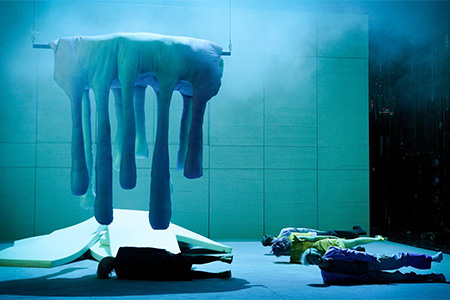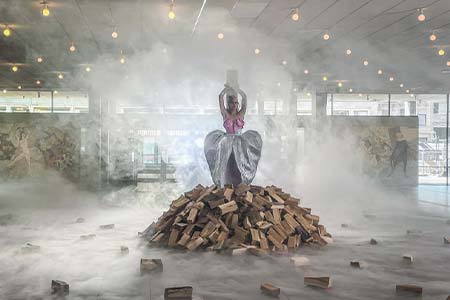2022
IPHIGENIA
Thalia Theater in Hamburg/ Salzburg Festspiele
Who is Iphigenia today? A figure rooted in myth, who we’ve met in so many different guises through the centuries.
Can she emancipate herself from the perspective of the author?
For Euripides, in the 4th Century BC, Iphigenia is the perfect victim. Cruelly deceived by her own father Agamemnon, she could not marry the hero Achilles, instead she was sacrificed so that the great war against Troy could begin. Saved from slaughter at the last minute by a goddess, she was forced to spend many long years away from her homeland in the land of Tauris, serving as a priestess. In 1779, Johann Wolfgang von Goethe then sent her to fight for humanity. So that she can save herself and brother Orest, Goethe gives her the persuasiveness of German idealism and also the feelings that she awakens in the King of the Taurians.
“Be clear with your narratives”, demands Johanna from Orleans in Ewelina Marciniak’s production at the 2021 Schillertagen. Female characters in literature have spent long enough being reduced to purely love and suffering. Splitting her version of Iphigenia into her younger self and an older version looking back, and setting the story within a modern family cosmos, Ewelina Marciniak takes on her third piece for Thalia and tries to bring it into the present day.
“In our interpretation of the myth, Agamemnon sacrifices his daughter very consciously. For the Agamemnon that Euripides is writing about, it’s the state, military and the feelings of the people that are all at stake. For his contemporary equivalent it’s all about reputation, career and authority. Iphigenia experiences her beloved father as someone who leaves her alone because he fears that there is no other route to success. So Iphigenia breaks down into two parts.” Joanna Bednarczyk
Text Joanna Bednarczyk, After Goethe and Euripides
Direction Ewelina Marciniak
Choreographie Dominika Knapik
Staging Mirek Kaczmarek
Costume Julia Kornacka
Music Jan Duszyński
Light Paulus Vogt
Photos Krafft Angerer
Dramaturgy Emilia Heinrich, Joanna Bednarczyk
Artistic collaboration, translation Alek Niemiro
With:
Rosa Thormeyer (Iphigenia)
Oda Thormeyer (Iphigenia)
Christiane von Poelnitz (Klytaimestra)
Sebastian Zimmler (Agamemnon / Toas)
Jirka Zett (Achill / Orestes)
Lisa-Maria Sommerfeld (Helena)
Stefan Stern (Menelaos)
Friedrich Dvořák (Orestes, alternierend)
Reviews
„With her physical, dance-oriented style, which she developed here with the choreographer Dominika Knapik, she succeeds in wresting life out of the text.” Michael Schleicher
„On a simple, spacious platform (Mirek Kaczmarek) there is only a grand piano in front of a large mirror, as in a music institute. Again and again the actors break out in choreographies (by Dominika Knapik), also a distinctive ensemble of Marciniak’s theatre, as if the characters were dancing, which they cannot express in words. That looks great, probably takes a lot of work to make.”


